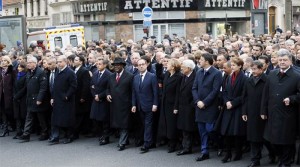 Gideon Rachman recently wrote a rather downbeat post in the FT entitled the “The West has Lost Intellectual Confidence”. He suggests in this opinion piece that he sees the ending of era – the time from the end of the Cold War to now. He is not the only opinionator that has suggested that we are ending a period of global order.
Gideon Rachman recently wrote a rather downbeat post in the FT entitled the “The West has Lost Intellectual Confidence”. He suggests in this opinion piece that he sees the ending of era – the time from the end of the Cold War to now. He is not the only opinionator that has suggested that we are ending a period of global order.
As I pointed out in a recent post, In a World of Order? Or is it Disorder? Richard Haas, the President of the Council on Foreign Relations, argues that the contemporary world order finds US hegemony on the wane with the “the likeliest future … one in which the current international system gives way to a disorderly one …” and as he concludes: “In short, the post-Cold War order is unraveling, and while not perfect, it will be missed.”
There appears to be no shortage of commentators today to declare the current order at an end . And the immediate events in France have added a frisson to the politics in the West. The terrorist killings in Paris have potentially brought the war in the Middle East to the heart of Europe in a serious way. Underlining this sense of impending extended terror was the French Prime Minister Manuel Valls’s declaration of “war” against radical Islam.
But let’s get back to Rachman. He is a most acute observer of international politics and the politics of Europe. Therefore, what he sees needs to be taken seriously. What Rachman sees then is this:
The sense that things are changing is strongest in the realm of ideas. In the past few years, the west has lost confidence in the strength of the three props on which the post-cold war world has been constructed: markets, democracy and American power.
So is this a loss of confidence in the West, and more particularly a loss of confidence in the United States? Rachman argues that with each idea – markets, democracy and American power – events have transpired that have undermined confidence in the global order.
For markets, the loss of confidence came with the global financial crisis of 2008. For democracy, or as Rachman calls it, “democratic evangelism” the loss of confidence has come with “horrors unleashed by the Arab uprisings.” For good measure Rachman also identifies the domestic political dysfunction in the US and in Europe. As for American power, Rachman asserts such reliability has been undermined by American actions in Iraq. For good measure Rachman adds the rise of China and the prospect of a challenger to the sole superpower suggesting “… America’s own ability and willingness to sustain its role as global hegemon is open to question.”
Now Rachman admits that the intellectual climate can shift quickly. I think that is right. But I am not really convinced that the loss of confidence Rachman describes is all that real. I will certainly give him the chilling consequences of the failure of the Arab Spring and the spread of Islamic radicalism. But there really hasn’t been democratic evangelism in American policy for some time – probably since the fiasco of Iraq. And certainly not for this current President. As for domestic political dysfunction, I buy it, but notwithstanding the failures – e.g. IMF reform, or treaty ratification – still democracy is not a major idea, in my opinion, in the politics of the contemporary global order.
As for markets, I think Rachman is too downbeat. Yes the global financial crisis was a huge crisis but here I buy into Dan Drezner’s thesis that global economic governance worked. There were individual national initiatives and probably less collaboration than coordination in the midst of the crisis. But if neo-liberalism has taken a hit, a belief in open markets and generally unfettered trade continues to hold. More critically, the evident rising contender, China, rather than demanding change has acted in a largely supportive role overall in the global economy. As for American power, Iraq and Afghanistan has hurt American foreign policy. The dithering in Syria has also not helped. But has the United States stepped away from its leading role? I don’t see it – whether it is the fight against ebola, or loose nuclear material, or the fight against ISIS.
Meanwhile the United States is going back to global summitry. The White House now says, according to the FT it will hold an international summit next month on how to fight “violent extremism” to deal with homegrown radicalism. Eric Holder, who for the moment remains the Attorney General, said the summit, which would bring together leaders from around the world, would look at new ways to share information and resources on terrorist threats.
So still leading from the front.
Image Credit: www.ndtv.com

